- Xavier Gómez Batiste is an international leader in palliative care. With over thirty years of experience in this area, he has not only been a pioneer in its implementation in health systems but has also contributed actively to positioning Catalonia as a pioneer in improving the quality of life of people who are at the end of their lives and those who suffer from chronic diseases, and their families. Gómez Batiste is a Doctor of Medicine, a specialist in oncology and a lecturer at the University of Vic - Central University of Catalonia, where he teaches on the bachelor’s degree in Medicine. For twelve years, he has directed the the Chair in Palliative Care that this University shares with the Catalan Institute of Oncology (ICO).
- Until 2022, he was also director of the Qualy Observatory, the WHO’s collaborating centre for Public Health Palliative Care Programmes, and scientific director of Comprehensive Care for People with Advanced Diseases, under the “La Caixa” Social Programme. This year, Gómez Batiste has received the Cicely Saunders Award from the European Association for Palliative Care (EAPC), in recognition of his career. The Chair obtained the IAHPC Institutional Recognition Award along with the “La Caixa” Foundation.
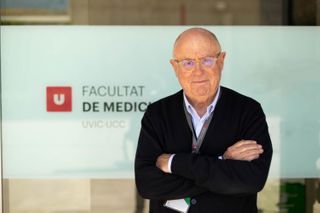
What is meant by palliative care today, and what has changed since the Chair in this field was established at UVic-UCC in 2000 or, even, since the first study centre on this subject was created in Catalonia in the 1990s?
Palliative care, as we now call it, is everything we can do to improve the quality of life of people who suffer from an advanced disease and have a limited life expectancy: control of symptoms such as pain, but also emotional support, communication and support in the ethical dilemmas of decision-making, as well as care for the family. The needs are physical, emotional, social, spiritual and ethical and, therefore, it is always necessary to work with a multidisciplinary team and provide comprehensive care.
The origins of this kind of care can be found in British hospices, which emerged in the 1960s as institutions outside of the health system to provide specific care for terminally ill cancer patients. The concept has evolved a lot, both there and everywhere. Catalonia has been a pioneer in the development of palliative care due, above all, to three decisive factors: firstly, from the outset we introduced the palliative care model into the public health and social system. The second decisive moment, from the turn of the twentieth century, was the realization that this type of care is needed not only by cancer patients with very short life expectancies, but also by patients with other diseases, such as dementia; cardiac, respiratory or renal failure; and neurodegenerative diseases. People with these illnesses have much longer life expectancies, often extending to years. Finally, the third turning point was the expansion of palliative care to chronic problems. In this way, it was separated from solely the end of life.
“In Catalonia we were pioneers in introducing the palliative care model into the public health system, in bringing this care to people beyond cancer patients and those who have chronic problems”
What is it about Catalonia that has fostered this leadership and has led it to become an international benchmark in the field of palliative care?
Initially, the leadership of people who believed in this, in the health and political fields, was key. However, despite being crucial, this leadership was not the only factor. We would not have been able to implement our own model without cultural and social maturity, and a very high human development index. This created a favourable environment and meant that, among other factors, Catalonia would be the first place in the world to legislate on palliative care and define it as a priority, and the World Health Organization (WHO) would take our model as a pilot project for others.
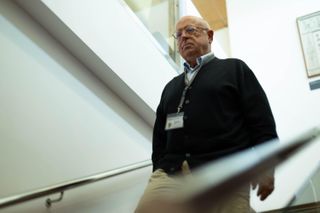
Over two decades later, are we still pioneers?
We have led other transitions in the context of palliative care, as we have realized that some aspects could be improved or further developed. This is the case of psychosocial and spiritual care. Identification of this shortcoming led us to create, fifteen years ago with the “La Caixa” Social Programme, a comprehensive care programme for people with advanced disease, which has just received an award from the International Association for Hospice and Palliative Care (IAHPC). Currently, this programme is implemented in 153 health centres, 173 home care teams and 165 residences throughout Spain. Since its launch, it has served more than 680,000 people, including patients and family members.
This is also the case of caring communities that, for example, through projects such as “Vic, caring city”, manage to involve society in palliative care.
“As an oncologist I was aware of all the unresolved, and often unnecessary, suffering of patients and their families, and I realized that work was needed to alleviate it”
What drove you to specialize in this very specific area of health that is palliative care?
There is something in my genes… My father was a humanistic general practitioner, and a very compassionate person who was very committed to his patients. So I started with an advantage, because he influenced me a lot and made an impression on my personal scale of values. In addition, my first job was as a general practitioner in a town of 800 inhabitants in Menorca, where direct, close contact with patients reinforced my interest in community medicine. Finally, specializing in oncology was also key: during my training as an oncologist, at the Hospital de Sant Pau, I was aware of the unresolved, and often unnecessary, suffering of patients and their families, and I realized that work was needed to alleviate it.
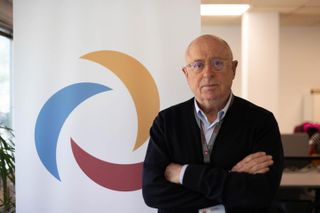
You call for comprehensive palliative care, but could we say that this must vary for each person depending on the disease they suffer from and their social context?
All patients who require palliative care, regardless of the disease they suffer from, have some common aspects, such as pain or progressive deterioration. But at the same time, each disease has specific aspects. I am thinking, for example, of paediatric palliative care, cases of ALS or people with dementia. They are all very different, even thought they share certain common denominators.
At the same time, of course, each patient has their own casuistry: their social conditions and the family support they have, which are determining factors and influence each case. Loneliness, poverty, isolation, lack of family support... these are all vulnerability factors that we must be able to detect and to which we must be able to respond. In fact, with the “La Caixa” Social Programme, we have identified the profile of the most vulnerable type of person: a woman, over 80 years old, with dementia and associated chronic diseases, who suffers from unwanted loneliness, is poor and lives in housing with poor conditions.
Finally, there is one last aspect to take into account: the fact that everyone experiences circumstances in a way that is unique to them as a person and that is marked by their values and beliefs, and by the approach they take to the disease, depending on factors such as resilience, character... or even sense of humour. Therefore, it would not be out of place to say that palliative care, whether at the end of life or for chronic disease, is unique and specific to each patient and, therefore, it is always necessary to provide tailor-made solutions.
“Each person's values and beliefs, as well as aspects of character such as resilience or a sense of humour, influence the way each person faces the end of their life”
Do we talk too little about death?
There is an English phrase that says “It is too early until it is too late.” And that's really the case. Death, or rather the fear of death and the process of suffering that it involves, is our last social taboo. And we often don't want to talk about it until, when we do, it is fast approaching, and by then we're too late and we have too little time to prepare ourselves. On the other hand, experiences such as “Vic, caring city” that have prompted debates on the topic of death have shown that there really is a great interest in talking about it, and that it can be done with humour and without the need to have transcendental speeches.
I remember, for example, interesting and surprising sessions with teenage high school students from the Jaume Callís Secondary School in Vic, with whom we had a great time talking about death without dramatizing it. We gave our opinions, for example, on the music we would like to hear on our death beds, and reflected on how to live in peace at the end of life or how to accompany people who are at this point. Experiences like this show that our society is capable of discussing death openly, of planning decision-making in advance, and therefore of reaching the end with more guarantees and support.
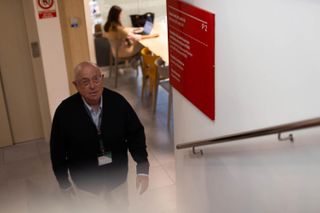
But how do we open up to society such an intimate, delicate and private moment as the end of a person's life?
The idea of caring or compassionate communities has two fundamental areas that are interrelated. The first is that society must have this participatory debate, it must work on culture and the relationship with death, both from a socio-cultural and an individual perspective. That is why we organize training, cultural and participation activities... aimed at very different audiences, from children aged 3 to 5 to elderly people. The second area involves increasing the caring capacity of this society, which goes far beyond encouraging volunteering and should ensure that the circle of people or the network that each of us has, which will sustain us at the end of our lives, has the knowledge and knows how to accompany us in these moments.
“We talk too little about death but experiences of caring cities show that it generates great interest and that it can be talked about, even with humour”
Preparing all of us together, then, seems to be key...
This is a monumental challenge, especially because it calls on everyone, from palliative care professionals to any healthcare professional, and including all citizens. However, if we achieve it, we will attain palliative care of excellence, understood as a right for everyone.
Some examples: the master's degree we created for specialized teams has evolved and is now focused on the entire health system and all specializations; and very soon we will launch a new consulting programme for residential homes, hospitals and primary care centres, to support them in improving their palliative care. This goes beyond strict training: we are talking about coaching, self-leadership, evaluation of results and, ultimately, transformation of the quality of care in each centre.
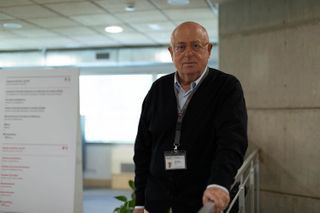
And not just training... at the Chair you carry out and promote research and the transfer of knowledge in this area.
The need to have an academic context was one of the reasons for creating the Chair, which united UVic-UCC with the Catalan Institute of Oncology (ICO) and which also meant opening up the range of research and the transfer of knowledge that could be done: we are not just talking about cancer and we include many other collaborators, such as the Catalan Institute of Health, the Hospital Universitari de la Santa Creu, “La Caixa” Social Foundation or, more recently, Sant Andreu Salut or Hospital Clínic, among others.
We like to call ours a “duck model”, because ducks can swim, run and fly, depending on the circumstances. This is our approach to problems, to which we want to provide solutions: we do it in a comprehensive, very flexible way, often blurring the barriers between training, research, transfer, consultancy and implementation of services.
“At the Chair we approach problems comprehensively and plastically, blurring barriers between training, research, transfer or consultancy to always find the best solution”
What are the future challenges of palliative care?
There is a lot of unknown territory that we need to enter, that is, many environments that we need to explore despite not knowing what we will find there. For example, we need to know much better about pain in patients with many pathologies, beyond cancer; and we are also obsessed with palliative care working well in groups with specific needs, such as people with dementia or certain vulnerable profiles, and to delve deeper into the loneliness of many patients. Likewise, we have a lot of ground to cover in the consulting field, both here and on an international scale. What we are very clear about is our purpose, which is to improve the quality of life of people with advanced diseases, and we go all out with this.
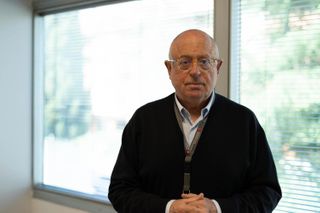
Has palliative care learnt anything from Covid?
It is superfluous to say that Covid was a tsunami that devastated the health and social system, from which we have not yet recovered. People died alone and there was nothing we could do about it. It was the antithesis of palliative care, which we were forced to abandon for a long time, because the initial aim of health systems, in the context of a pandemic, was to avoid contagion, a decision that was not very reflective or compassionate. All those deaths left relatives with very complicated grieving processes, relatives who were given no opportunity to decide whether they wanted to take the risk of accompanying the person at the end of their life, even though it meant exposing themselves to infection. In any case, what happened opens ethical questions that can help us to learn many things, but this topic would need to be addressed in a separate interview.